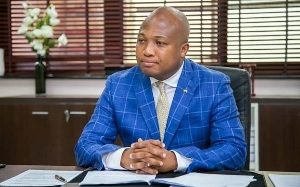Where is the Vision?
After listening to the last African Representative on stage at the just-ended United Nations General Assembly, I couldn’t help but grab my pen. If anybody has been listening to these guys since beyond six years ago, it’s sad to be so certain that they will come back next year with the same gibber-jabber of masterful diagnoses of acute African problems, Western finger-pointing and persuasive presentations of how to eradicate the poverty, the diseases and the high illiteracy rates shattering the hopes of millions of hard-working Africans rather trapped between the promise of colonial freedom and the price of visionless leadership.
It is sad to be so certain that the cassava farmer in Afram plains will still not have any means of transporting his produce to Ejura for trade. That hardworking teachers and nurses will continue to subsist so members of parliament can continue to churn out highest remunerations for themselves. That three-hour journeys between Accra and Kumasi will continue to gyrate into five-hour nightmares on endless construction works. That open drains siding the streets of Saboba will continue to provide safe haven for killer mosquitos. That foreign multi-national corporations will continue to control the mining of national resources while leaving citizens to drink from cyanide-polluted rivers.
Insert any African country into this puzzle and it fits in perfectly. Ghana is only an example, in spite its inspiring economic progress.
Isn’t it still sad that communities and countries will continue to take not just days but years and decades to settle simple differences on land and ownership of natural resources? And that all this while, those resources must remain untouched, lest a degeneration of differences into retrogressive conflicts?
Congo, according to The World Bank is summarily one of the natural-resource richest countries in the world. The Free Library estimates Congo’s untapped natural resources at US$24 trillion, which is equivalent to the combined GDPs of the U.S and the entire Europe. Congo, at the same time, according to the Forum for Emerging Economies, has unenviably maintained the world’s worst GDP growth rate for the past four decades.
Kenya, a country poorly ranking at 154 out of 183 in per capita GDP levels according to World Bank Data, continues to have the second highest paid parliament in the world. Nigeria, sadly ranking 6th in population (70%) living under the poverty line continues to have the world’s highest paid parliament, with each one shamelessly carrying home a basic $16.5 million a year.
Where is the vision? What does Africa want to look like in ten or twenty years? Which African country has such blueprint? Does any country even have a comprehensive national development policy framework?
Isn’t it even sadder to be so certain, that China, a country that imports more than 70% of its natural resource needs, will continue to maintain an economically viable position so as to offer billion-dollar loans, while procuring local contracts to build national sports stadia, modern interchanges, bridges and motorways, statues and offices for African governments?
How are we projecting our competitive advantages of low labor costs and abundant natural resources? How are we industrializing our local economies to add value to our natural resources? How are we transforming our public institutions to reflect performance and democratic principles? How are we reforming our educational systems to provide room and capacity for talent development and self-creativity? How are we empowering our private sectors to champion growths so that governments can concentrate on the business of governing?
How are we coming back next year to change the rhetoric and present a better story?
Author: John Taden
(johntaden@yahoo.com)
Texas A&M University
Opinions of Sunday, 6 October 2013
Columnist: Taden, John


















